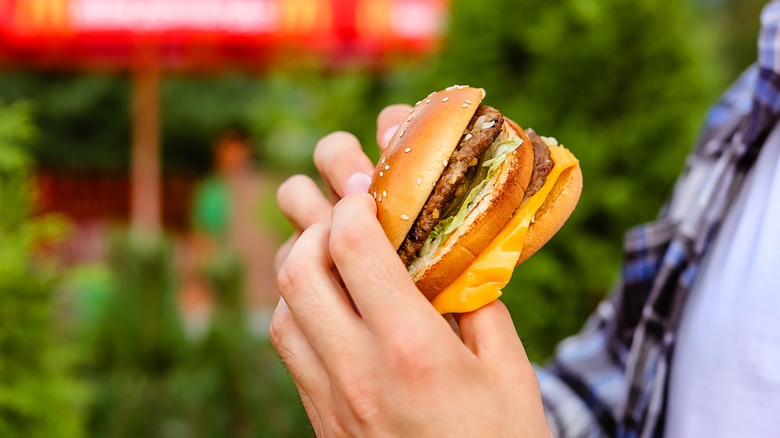How Accurate Was Supersize Me, Really?
The bigger the company is, the more shocking the secrets behind it are. If we are to apply this principle to McDonald's, then "Supersize Me" revealed the fatty, greasy secrets hidden behind the smiling clown faces and golden arches. For those who may have never heard of "Supersize Me," it is a 2004 documentary produced by Morgan Spurlock which examines a lifestyle built around consuming McDonald's and the myriad of negative health effects that entails.
Around that time, McDonald's was running its Supersize menu promotion, where customers could upgrade their fries and drinks to a much larger size for only a few dollars more, and the documentary stood in stark contrast with the chain's belt-busting deal. While McDonald's claims that "Supersize Me" had no effect on their decision to remove the promotion from their menu (via NBC News), many couldn't help but note the rather coincidental timing.
While it is true that "Supersize Me" did have an impact on the health community and changed the way some Americans look at fast-food restaurants, there are those who argue that Spurlock's documentary may not be as factual as it appears. Some believe that Spurlock's supposed claims of poor health and mental wellness weren't directly connected to his month-long diet of McDonald'smor and that the entire documentary was biased against the fast-food chain, which led to some parts of the documentary being wildly inaccurate. But how exactly can these claims be proven to begin with?
No one has been able to replicate Supersize Me experiment
In any scientific pursuit, the only way to prove a hypothesis true or false is to perform an experiment. If the experiment is unable to be replicated, then those claims may not be true. This is the case for some researchers who attempted to repeat Spurlock's fast-food experiment: they were unable to justify Spurlock's claims of physical and mental issues just from eating fast food.
A 2006 article from The Guardian details the experiment, similar to what Spurlock had performed in the documentary, which was undertaken by Swedish researchers. Despite participants consuming as much fast food as Spurlock, none of them seemed to suffer the same afflictions Spurlock had. While most did put on some weight and feel more tired, none of them suffered mood swings or extreme liver damage. A researcher even claimed that Spurlock's extreme reactions to fast food could have been from him switching from a low-energy diet, making his body unable to cope with such greasy food.
The Center for Consumer Freedom also argues that Spurlock was a heavy user of alcohol during the experiment. Spurlock had, they argued, "conveniently" forgotten to mention this fact during "Supersize Me," blaming any health issues he may have suffered from alcohol abuse on McDonald's food.
While McDonald's food is indeed unhealthy to eat in large portions, some believe that "Supersize Me" overexaggerated fears of unhealthy food to make a profit.

